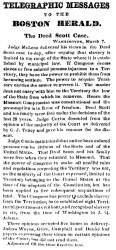Record Data
Transcription
The Dred Scott Case.
Washington, March 7.
Judge McLean delivered his views in the Dred Scott case to-day, after arguing that slavery is limited to the range of the State where it is established by municipal law. If Congress deems slaves or free colored persons injurious to a Territory, they have the power to prohibit them from becoming settlers. The power to acquire Territory carries the power to govern it. The master does not carry with him to the Territory the law of the State from which he removes. Hence the Missouri Compromise was constitutional and the presumptions is in favor of freedom. Dred Scott and his family were free under the decisions of the last 28 years. Judge Curtis dissented from the opinion of the majority of the Court as delivered by C. J. Taney and gave his reasons for the dissent.
Judge Curtis maintained that native born colored persons can be citizens of the State and of the United States. That Dred Scott and his family were free when they returned to Missouri. That the power of Congress to make all needful rules and regulations respecting the Territory was not, as the majority of the Court expressed, limited to Territory belonging to the United States at the time of the adoption of the Constitution, but has been applied to five subsequent requisitions of land. That Congress has power to exclude slavery from the Territories, have established eight Territorial governments without, and recognized slavery in six, from the time of Washington to J. Q. Adams.
These opinions occupied five hours in delivery. Judges Wayne, Grier, Campbell, and Daniel had papers expressing their views on certain opinions of the Court, but did not read them.
Adjourned till the time fixed by law.










